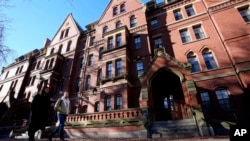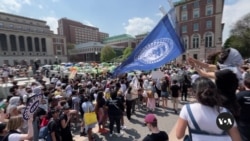Student Union
Why Don't More Japanese Students Study Abroad?

Are Japanese students too lazy to study abroad long term?
Or are they too busy?
While the Japanese government endeavored in 2013 to double the number of its students studying abroad, instead, the numbers have fallen, says the Paris-based Organization for Economic Co-operation and Development.
Japan’s initiative - “Tobitate!” or “Leap for Tomorrow” - sought to double the number of its university students abroad from 60,000 to 120,000, and the number of high school students abroad from 30,000 to 60,000.That would send 180,000 students abroad by 2020.
But figures from 2014 show a 36 percent decrease from the 2004 peak of 82,945 students abroad long term.
“The government hasn’t provided much support for students who do a long-term study-abroad, especially for those who seek academic degrees at foreign universities at the undergraduate level,” said Yukiko Shimmin, an assistant professor and international education adviser at Hitotsubashi University in Tokyo, to the Japan Times.
Japanese students are discouraged from studying overseas because of busy academic schedules and time required for clubs, part-time jobs and studying for qualifications that could be useful when job hunting.He said the high language-test scores required for long-term study-abroad programs is a major challenge.
Students in Japan “don’t know the global dynamics,” said Masakazu Watanuki, an economics professor from Chuo University in Tokyo, who sponsors Japanese exchange students to Washington every year.
He said Japanese students have grown somewhat lazy with their comfortable lives in Japan.“They have very little incentive to go abroad,” Watanuki told VOA Student U.
“Japanese students are not challenged enough or motivated to leave the country,” said Minori Takahashi, a sophomore at American University in Washington, who came to the United States for her final two years of high school.“They are just afraid to go out.”
Japanese students feel they have to conform to the same path: high school, college and then a job, she said.Study abroad is not a typical piece of the Japanese educational path.
Another reason for the decrease is the country’s demographics.The number of 18-year-olds in Japan has been dropping since 1991’s peak of two million. Projections see the numbers falling even further to less than one million 18-year-olds by 2031, according to the Japanese Ministry of Education, Sports, Culture, Science and Technology.
However, while long term study has declined, short term has risen, according to Japan Student Services Organization.
One of Watanuki’s students, Madoka Konno, is in a three-week program in Washington before studying in Belgium for nine months.She said she was able to study abroad because of scholarships she received from “Tobitate!” and because she learned English when she was young.
She said she is concerned for Japan’s future if more Japanese students don’t go abroad and experience global business.
“Japanese people have to go abroad and do business abroad,” Konno said.
Takahashi agrees.She said she is afraid Japan will fall behind in the interconnected global economy if more students do not go abroad.
She said more students don’t study abroad because it is too expensive, despite scholarships like “Tobitate!”
According to QS Top Universities, college tuition costs in Japan are between $4,140 and $8,280 annually.
In the United States, the average annual cost for a public university out-of-state was $22,958 for the 2014-2015 academic year. That year, a private school averaged $31,321.
Hitotsubashi’s Shimmin told the Japan Times a rise in short-term study abroad programs at his school is because of funding from the Japan Student Services Organization.
A spokesperson from the Ministry of Education, Sports, Culture, Science and Technology told the Japan Times the agency has no plans to lower the 180,000 student goal, despite the recent figures.
“I’m sad a lot of students don’t go study abroad,” Konno said.
Please share your suggestion in the comments here, and visit us on Facebook, Twitter, Instagram and LinkedIn, thanks!
See all News Updates of the Day
- By VOA News
Many African students are experiencing US visa rejections

In 2022, 71% of student visa applications from Western Africa were rejected.
Visa agents are not happy – and are finding ways to help applicants with paperwork and the interview. Maina Wururu reports for The PIE News. (April 2024)
- By Tina Trinh
US college students face muted graduations amid Gaza war protests
Commencement ceremonies are being scaled back or canceled at U.S. universities because of security concerns over pro-Palestinian student protests. While some campus demonstrations have resulted in concessions, others have led to violent confrontations. VOA’s Tina Trinh has the story from New York.
- By Melos Ambaye
Police arrest 33 at George Washington University protest encampment

Police in Washington cleared a pro-Palestinian protest encampment at George Washington University early Wednesday, arresting 33 people, authorities said.
Arrests were made on charges of assault on a police officer and unlawful entry, the District of Columbia's Metropolitan Police Department said.
A congressional committee canceled a hearing on the university encampment Wednesday. D.C. Mayor Muriel Bowser and Washington Police Chief Pamela Smith had been scheduled to testify about the city’s handling of the protest before the House Committee on Oversight and Accountability.
University parents and faculty members gathered Wednesday afternoon for a press conference to condemn the handling of the protests by police and school leaders.
“The university clearly does not value the students at all and has endangered the safety of our children by unleashing officers dressed in full riot gear to assault and spray our children in their eyes with pepper spray,” said Hala Amer, whose son participated in the campus protests.
Police said they dispersed demonstrators because "there has been a gradual escalation in the volatility of the protest."
American University professor Barbara Wien said she stayed in the encampment with GW students. She described the student protesters as democratic and peaceful.
Police started to shut down the tent encampment after dozens of protesters marched to GW President Ellen Granberg's on-campus home on Tuesday night. Police were called, but no arrests were made.
Speakers at the conference called for Granberg’s resignation because, they alleged, she refused to meet and negotiate with student protesters.
“You keep inciting violence and ignoring the students,” Amer said about Granberg in an interview with VOA after the conference. “It will just lead to more violence. You need to talk to your students.”
GW officials warned students that they could be suspended for engaging in protests at the school’s University Yard, an outdoor spot on the campus.
"While the university is committed to protecting students' rights to free expression, the encampment had evolved into an unlawful activity, with participants in direct violation of multiple university policies and city regulations," a GW statement said.
More than 2,600 people have been arrested at universities across the country in pro-Palestinian protests, according to The Associated Press.
Students are calling on their university administrations to divest investments from Israel or companies with ties to Israel. Demonstrators have gathered in at least 50 campuses since April 17, carrying signs that read "Free Palestine" and "Hands off Rafah."
Rafah is Gaza’s southernmost city, where most of the territory’s population has clustered. The area is also a corridor for bringing humanitarian aid into the Palestinian territory.
Israel seized the Gaza side of the Rafah crossing on Tuesday, while shutting off the nearby Kerem Shalom crossing, drawing criticism from humanitarian groups. Israel said Wednesday that it had reopened Kerem Shalom.
The nationwide campus protests started in response to Israel's offensive in Gaza that began after Hamas launched a terror attack on Israel on October 7, killing about 1,200 people and taking roughly 250 hostages.
More than 34,000 Palestinians have been killed in Israel's offensive, according to the Gaza Health Ministry. Israel warned it could "deepen" its operation in Rafah if talks failed to secure the release of the hostages.
Some information for this report came from The Associated Press.
- By VOA News
What to ask on a college visit

Sarah Wood lists 32 questions for applicants to learn more during a campus visit. (April 2024)
- By VOA News
US is now the most desirable country for international students

That’s according to this year’s Emerging Futures research survey, from education consultant IDP Connect. Other Western countries have slipped due to new visa restrictions and caps on international students. Read a summary of the research from ICEF Monitor. (April 30, 2024)









